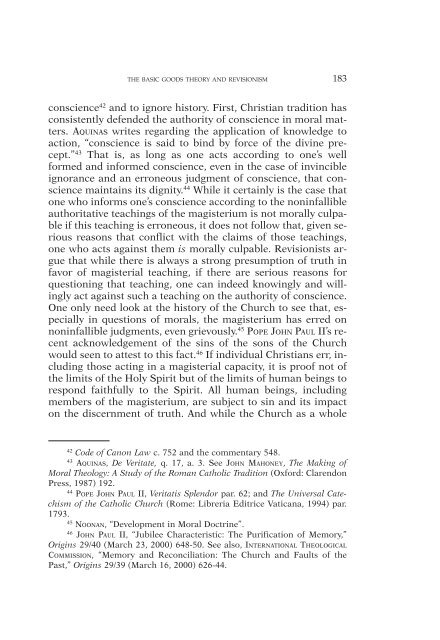Avant-propos - Studia Moralia
Avant-propos - Studia Moralia
Avant-propos - Studia Moralia
Create successful ePaper yourself
Turn your PDF publications into a flip-book with our unique Google optimized e-Paper software.
THE BASIC GOODS THEORY AND REVISIONISM 183<br />
conscience 42 and to ignore history. First, Christian tradition has<br />
consistently defended the authority of conscience in moral matters.<br />
AQUINAS writes regarding the application of knowledge to<br />
action, “conscience is said to bind by force of the divine precept.”<br />
43 That is, as long as one acts according to one’s well<br />
formed and informed conscience, even in the case of invincible<br />
ignorance and an erroneous judgment of conscience, that conscience<br />
maintains its dignity. 44 While it certainly is the case that<br />
one who informs one’s conscience according to the noninfallible<br />
authoritative teachings of the magisterium is not morally culpable<br />
if this teaching is erroneous, it does not follow that, given serious<br />
reasons that conflict with the claims of those teachings,<br />
one who acts against them is morally culpable. Revisionists argue<br />
that while there is always a strong presumption of truth in<br />
favor of magisterial teaching, if there are serious reasons for<br />
questioning that teaching, one can indeed knowingly and willingly<br />
act against such a teaching on the authority of conscience.<br />
One only need look at the history of the Church to see that, especially<br />
in questions of morals, the magisterium has erred on<br />
noninfallible judgments, even grievously. 45 POPE JOHN PAUL II’s recent<br />
acknowledgement of the sins of the sons of the Church<br />
would seen to attest to this fact. 46 If individual Christians err, including<br />
those acting in a magisterial capacity, it is proof not of<br />
the limits of the Holy Spirit but of the limits of human beings to<br />
respond faithfully to the Spirit. All human beings, including<br />
members of the magisterium, are subject to sin and its impact<br />
on the discernment of truth. And while the Church as a whole<br />
42 Code of Canon Law c. 752 and the commentary 548.<br />
43<br />
AQUINAS, De Veritate, q. 17, a. 3. See JOHN MAHONEY, The Making of<br />
Moral Theology: A Study of the Roman Catholic Tradition (Oxford: Clarendon<br />
Press, 1987) 192.<br />
44<br />
POPE JOHN PAUL II, Veritatis Splendor par. 62; and The Universal Catechism<br />
of the Catholic Church (Rome: Libreria Editrice Vaticana, 1994) par.<br />
1793.<br />
45<br />
NOONAN, “Development in Moral Doctrine”.<br />
46<br />
JOHN PAUL II, “Jubilee Characteristic: The Purification of Memory,”<br />
Origins 29/40 (March 23, 2000) 648-50. See also, INTERNATIONAL THEOLOGICAL<br />
COMMISSION, “Memory and Reconciliation: The Church and Faults of the<br />
Past,” Origins 29/39 (March 16, 2000) 626-44.

















